Jan 04, 2025 – Day 12 of Bhutan Survey_Nyakhar-Tsheldang and Kamjong-Duengmang Chiwog
Hello. It’s the 12th day of the Bhutan survey. Today, Sunim had conversations with residents of Nyakhar-Tsheldang and Kamjong-Duengmang Chiwogs in Nangkor Gewog.
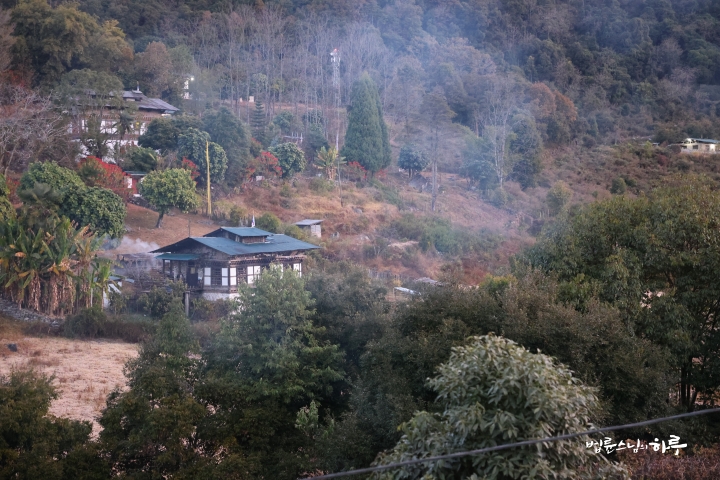
Sunim completed his early morning practice and meditation at the homestay, proofread manuscripts, and departed for Nyakhar-Tsheldang Chiwog at 8 AM. To meet residents of both Nyakhar and Tsheldang villages at once, we searched for a midpoint between the two villages. Finding no suitable space, we ended up having the conversation in an empty lot of an old building. After about an hour’s drive, they arrived at the meeting place where residents from Nyakhar village had already arrived to greet Sunim.
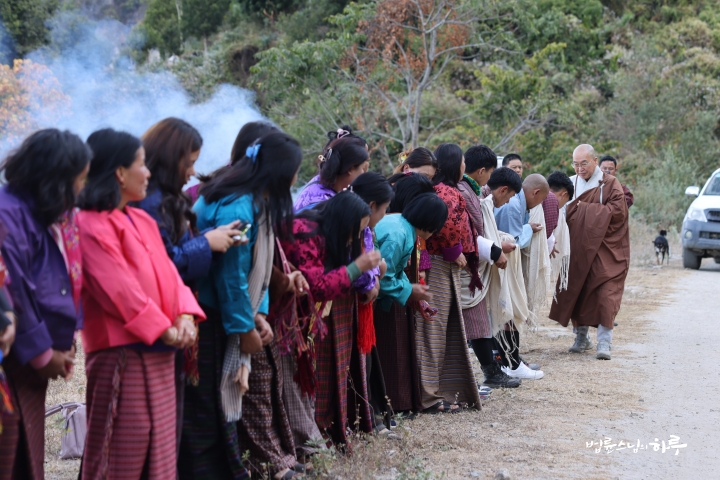
First, the Nyakhar Tshogpa explained the current situation of the village, and then Sunim began the conversation with the residents. Even with thick clothing, the weather was quite cold.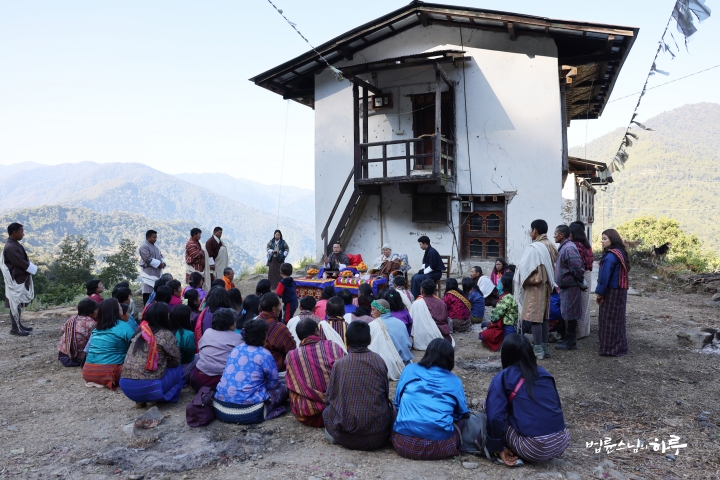
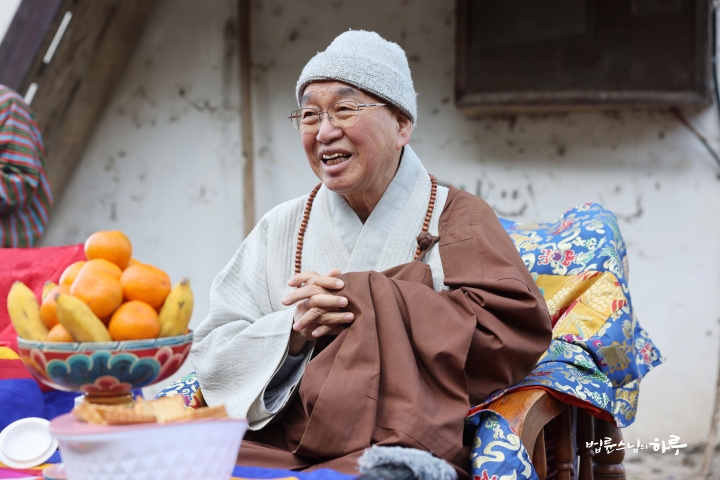
“It’s nice to meet you all. You gathered early in the morning, and it’s very cold, isn’t it? I’m sorry for making you sit uncomfortably on the ground like this. The Tshogpa should have prepared carpets; it’s not right to make residents sit like this.” (Laughter)
Sunim continued the conversation with a bright smile.
“I’m from Korea. Do you know Korea?”
“No.”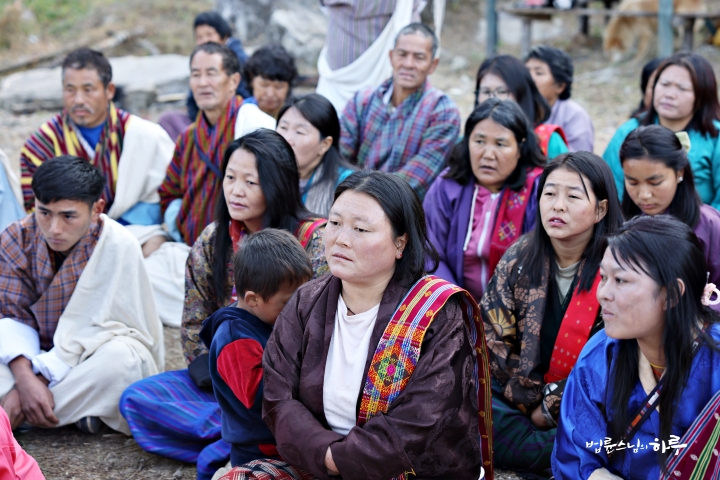
“Korea is very far from here. (Laughter) Even though we’re far apart, we could meet like this by the grace of Buddha because you are disciples of Buddha and so am I.”
Not long after the conversation started, residents from Tsheldang village arrived with a noisy truck sound. Sunim welcomed them and continued the conversation.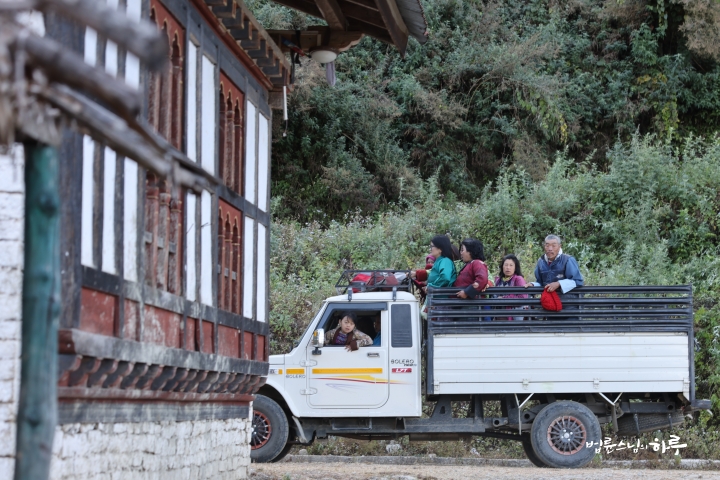
“When people say they are ‘poor,’ it usually means they lack food, clothing, or housing, or their housing facilities are poor, they have no land, or their annual income is too low. But looking at Bhutan, there are more aspects that don’t fit this description of poverty. There’s water, food, roads, electricity, and even in rural areas like this, you have mobile phones and internet.”
Sunim then positively evaluated Bhutan’s living environment while mentioning areas that need improvement.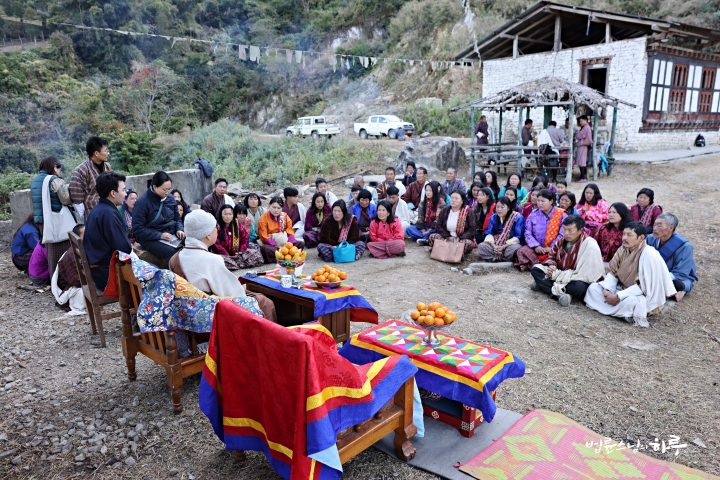
“But it’s true that life is a bit inconvenient. There are no shelves in houses to organize things, kitchens are too low making work uncomfortable, families live together in one big room without partitions, and there are no toilets or they’re old and dirty. However, these problems can be solved with just a little facility improvement. If our lives become just a bit cleaner and more convenient, we can feel ‘happy’.”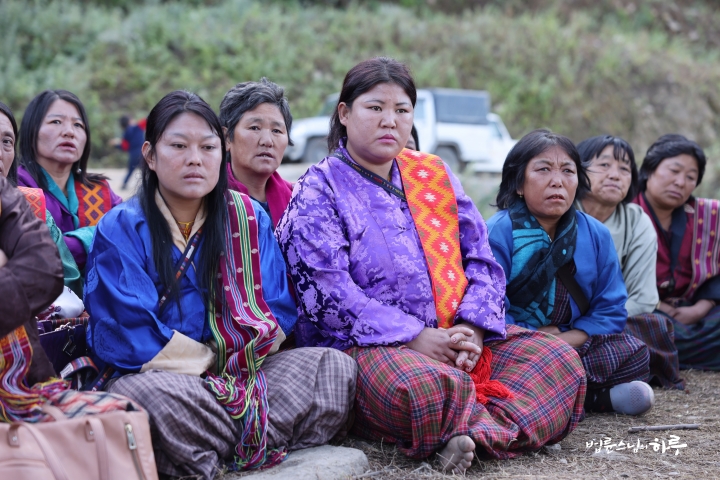
Sunim also introduced the philosophy of the JTS project.
“But the government can’t do all of this. That’s why the JTS project aims for ‘We develop our own village.’ If you decide to repair your houses and make the village a better place to live, JTS can provide the necessary materials. It’s a project that supports you when you step up to do it yourselves. Do you understand?”
“Yes.”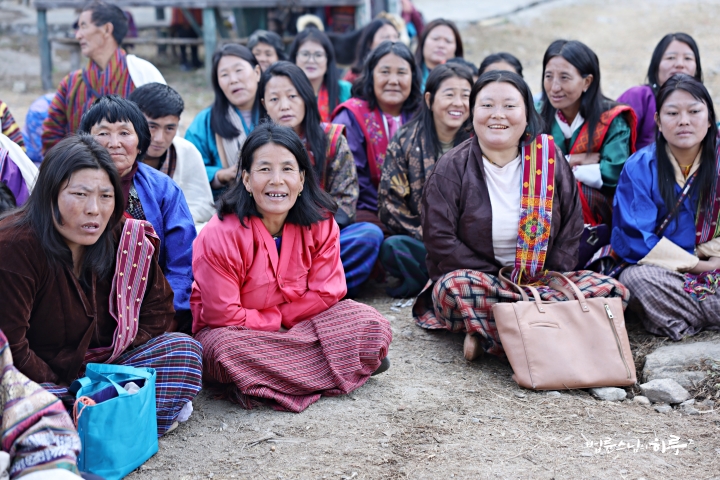
Sunim asked various questions to understand the village situation, such as whether they have enough water, if there are shelves in their houses, if they cook with fire inside the house, and if there are partitions inside the houses.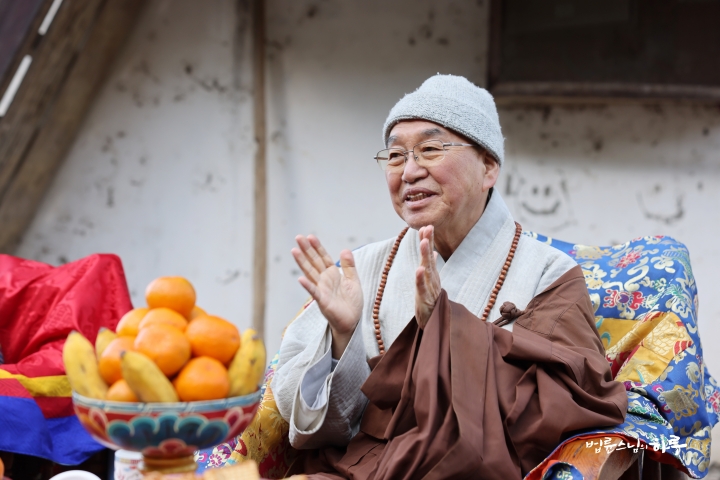
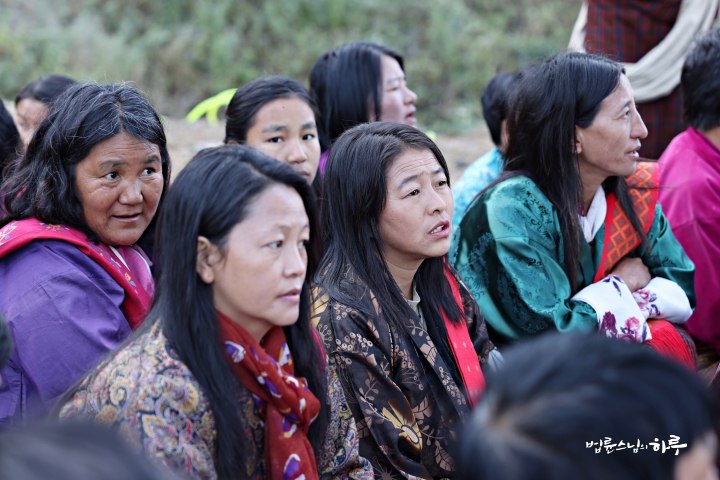
According to residents, many households lacked partitions and shelves, and some families were still living in smoke-filled conditions from cooking fires inside their rooms. Sunim encouraged the residents and emphasized that they could improve their homes with their own hands.
“We’ll provide tools, so with a little learning, you can make tables or shelves yourselves.”
“Yes, we can do it if you teach us.”
“Then let’s work together to make our houses clean and convenient.”
“Yes, that’s good!”
“Those who want to improve their houses like this, please raise your hands.”
The villagers all raised their hands. Their expressions were noticeably brighter than when the conversation started.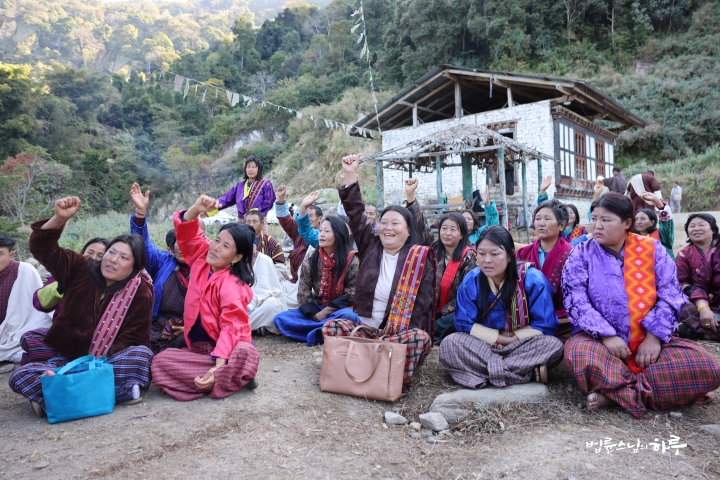
After about an hour of conversation with the residents, the Zhemgang Dzongda made the final remarks and ended the discussion.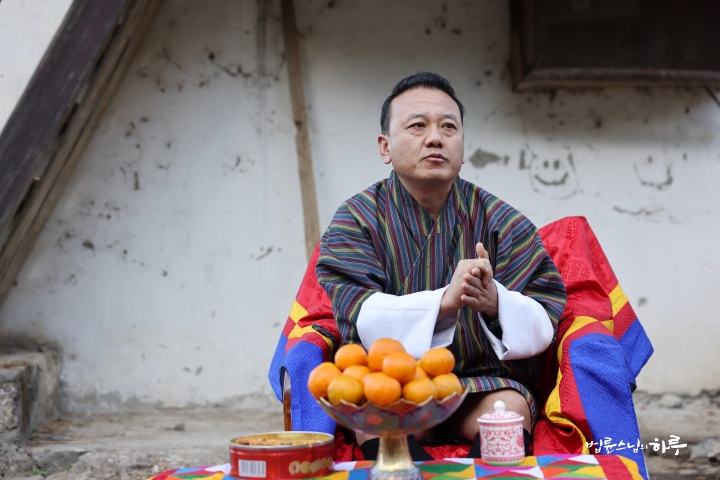
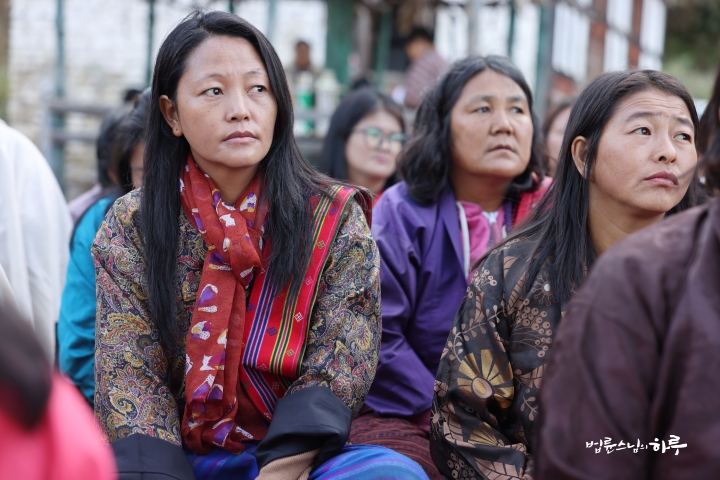
Next, Sunim visited Nyakhar Primary School to check the aging school facilities.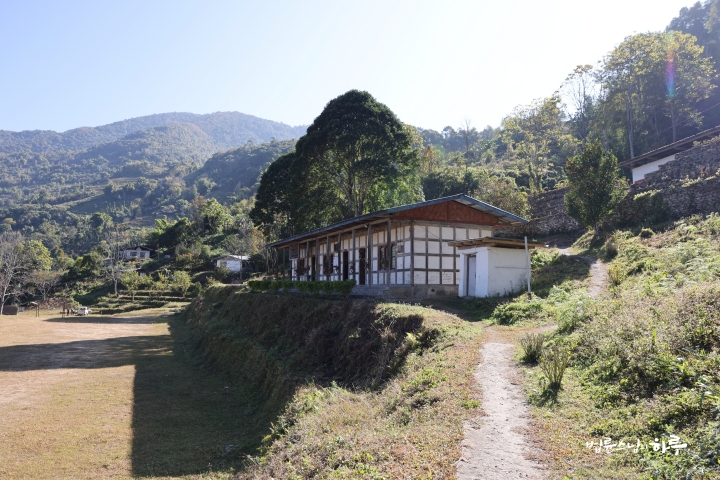
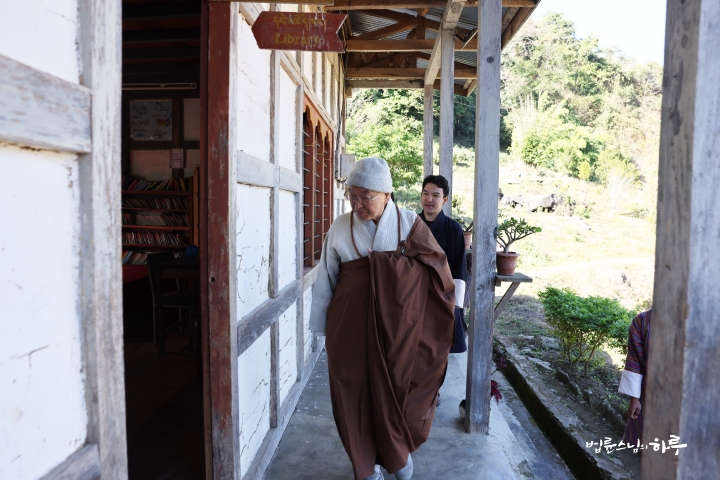
Sunim carefully inspected the classrooms, toilets, corridors, and ceilings. The classroom floors were scratched and dented in various places by the metal legs of desks and chairs.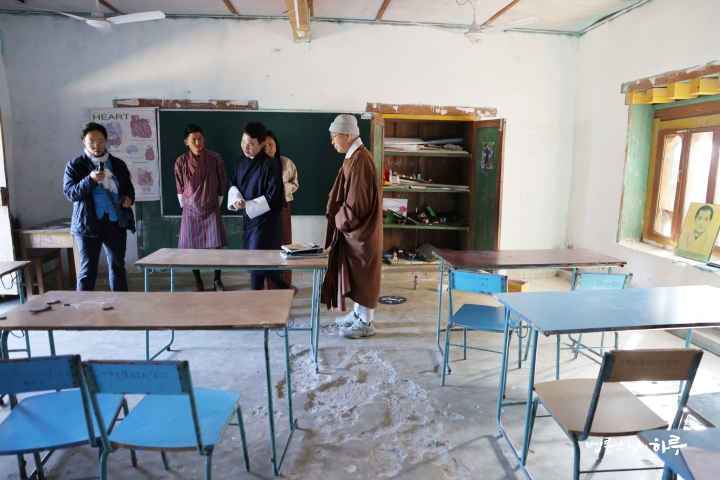
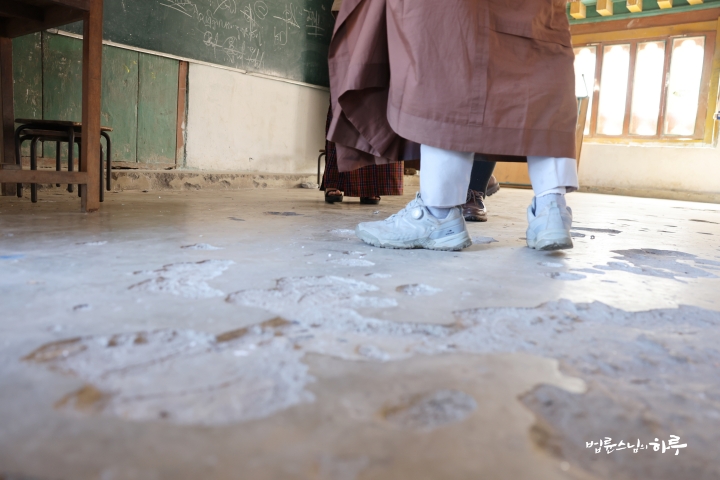
The outer wall of the toilet had collapsed, but the interior was being kept clean.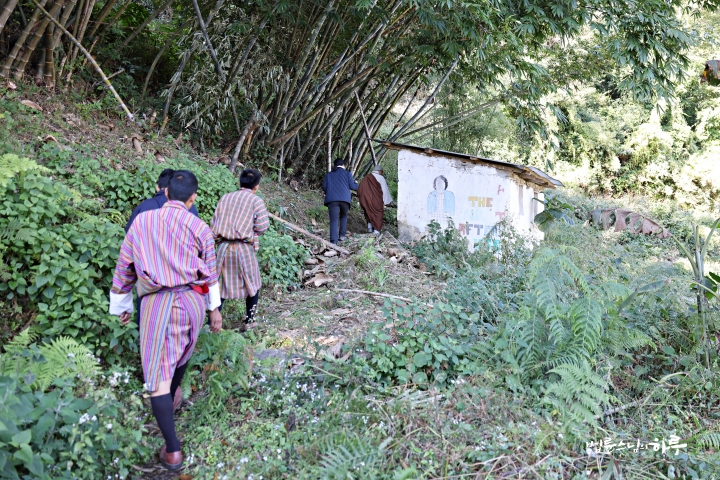
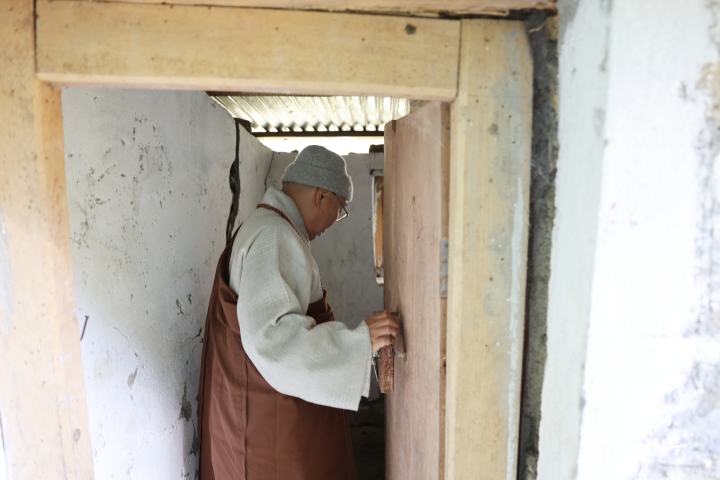
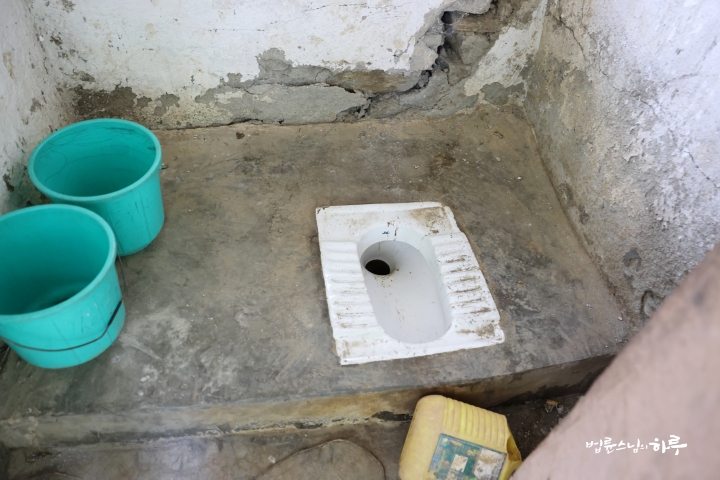
As the survey of Nyakhar Chiwog was nearing completion, Sunim stopped and asked the Zhemgang Dzongda a question.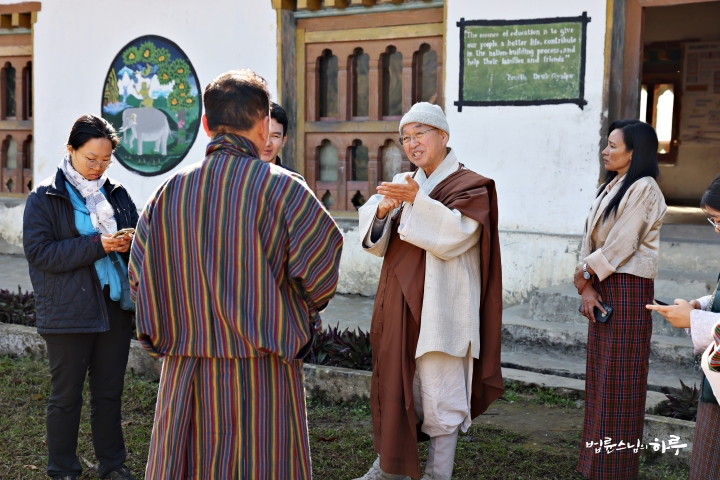
“Dzongda, yesterday I surveyed Thrisa Chiwog and met several people with disabilities there. The villagers also requested facilities for the disabled. One child had an intellectual disability and spent all day wandering around the neighborhood. These children should also go to school and receive education, but are there no educational facilities for disabled children in Zhemgang Dzongkhag?”
The Dzongda explained in response.
“Currently, there are only two special schools for the disabled operating in eastern and western Bhutan. There aren’t special schools in each dzongkhag yet. I know that child in Tsholingkhar. But most parents of disabled children don’t want to send their children far away. They want to care for their children themselves, so they’re reluctant to send just the child to a distant special school.”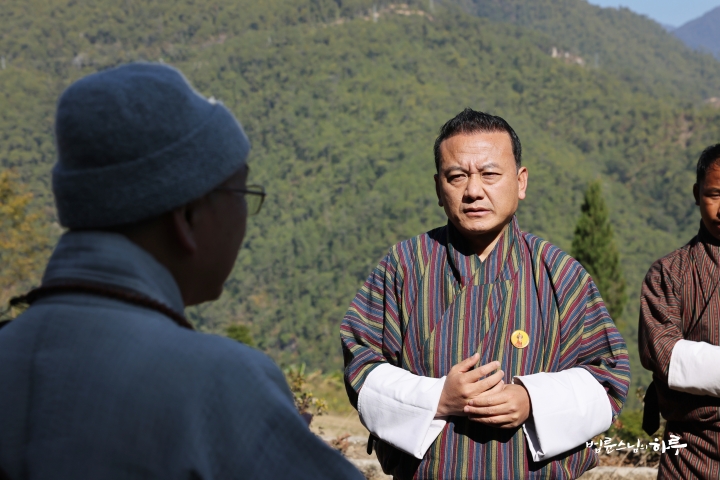
Sunim emphasized the need for education for disabled children and offered his opinion.
“Still, for the sake of the child, they need to receive education in special facilities. Is it necessary to establish facilities for disabled children in the central region? Would it be good to equip a large school like Yebilaptsa with facilities for disabled education in the central region?”
The Dzongda explained the current situation in Zhemgang Dzongkhag.
“There are schools with special facilities in Zhemgang Dzongkhag. Zhemgang Higher Secondary School and Zhemgang Lower Secondary School are designated as schools with special facilities by the Ministry of Education. However, the primary school doesn’t have dormitory facilities for disabled children. We requested investment from private organizations, but it was ultimately rejected due to strict qualification conditions. Students with disabilities too severe to be educated in special facilities are sent to special schools in the east or west for education.”
“Then you have teachers who can provide special education. Teachers with specialized training are essential.”
“Yes, we have teachers with specialized training in Zhemgang Dzongkhag.”
Sunim once again emphasized the importance of facilities for the disabled and proposed an alternative.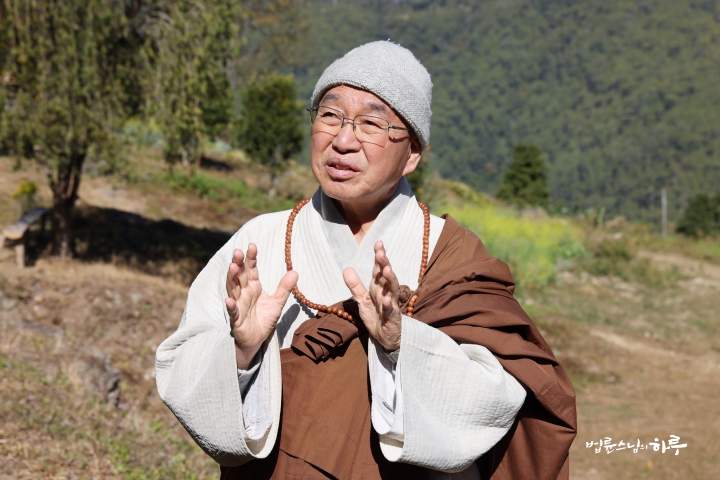
“The number of children with physical disabilities is likely to increase in the future. That’s why it’s necessary to have special education facilities in each dzongkhag. Keep requesting from private organizations, but if that doesn’t work out, it would be good to proceed with this project separately in the latter part of the JTS project. These special education facilities can’t be done simply by providing materials. Experts need to design customized facilities for the disabled.
If the government can provide teachers to run the special school, JTS will support the facilities. JTS’s philosophy is that every child has the right to education, regardless of whether they have disabilities or what environment they’re in.”
The Dzongda responded positively to this proposal.
“Yes, I understand.”
Sunim then pointed out the poverty rate issue in Zhemgang Dzongkhag and requested specific statistics.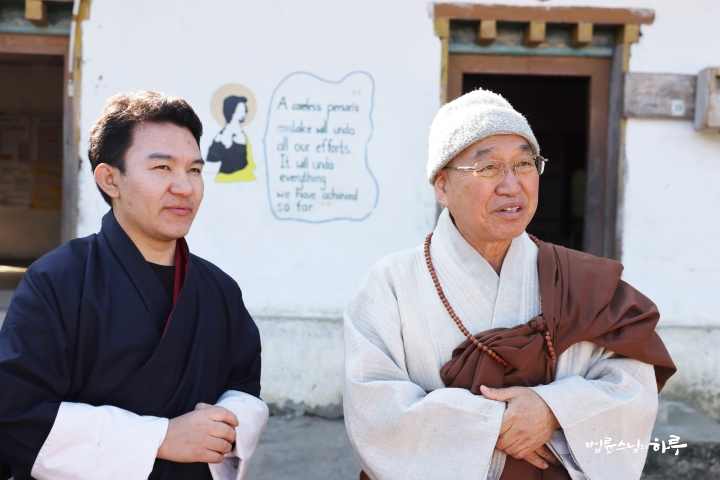
“Dzongda, to lower the poverty rate in Zhemgang Dzongkhag, the current projects alone will be difficult. How much relevance do the house repair and irrigation improvement projects have to the data used to calculate the poverty rate? We need to check what data is used to calculate the poverty rate. This will allow us to measure the project outcomes more accurately later.”
“Yes, I understand.”
After this, Sunim finished the survey of Nyakhar Primary School and moved to the next survey site, Kamjong village, after 11 o’clock.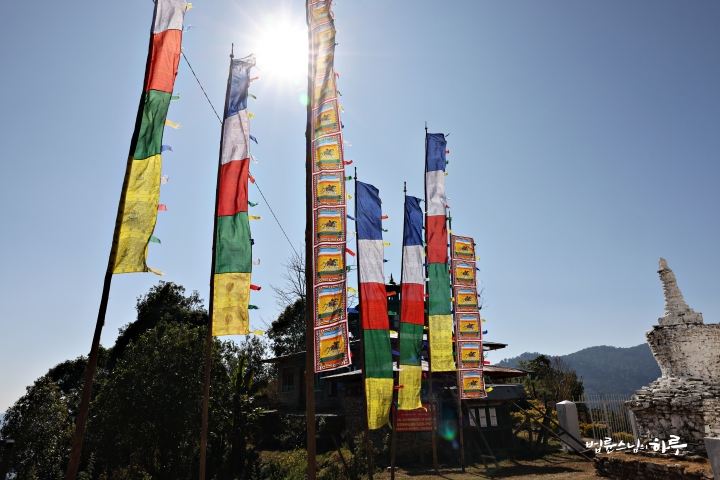
Upon arriving at the entrance of Kamjong Lhakhang, villagers were waiting for Sunim. After greeting the residents, Sunim went up to the temple to pay respects and then began a conversation with the residents.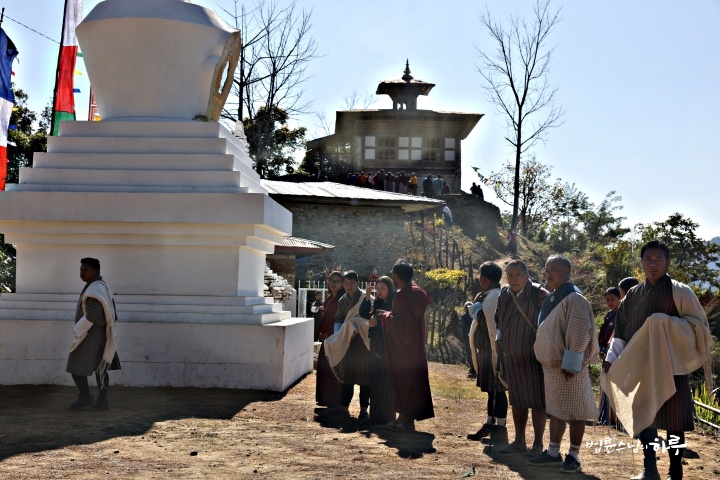
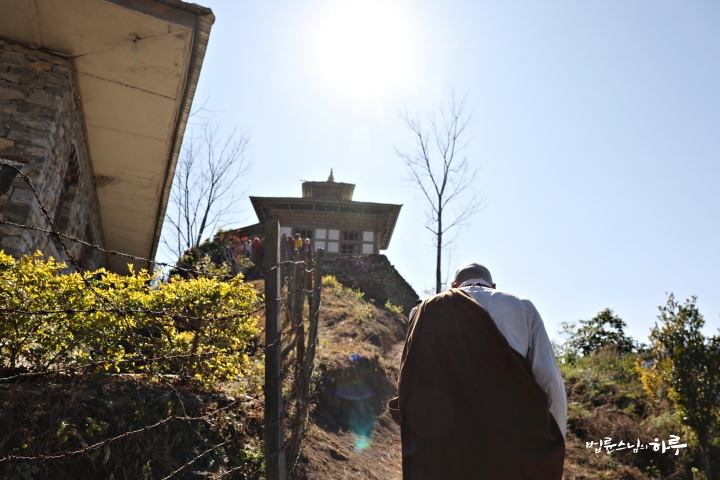
After the Tshogpa of Kamjong introduced the village situation, Sunim greeted the residents.
“I have listened carefully to what Chokba said. Everyone, it’s nice to meet you. I am from Korea.”
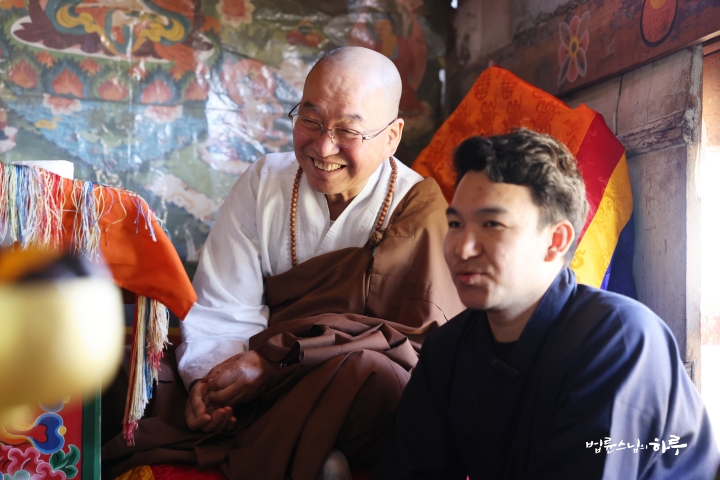
Sunim explained in detail about the circumstances that led him to come to Bhutan, the reason for visiting the Zhemgang region, and the projects currently in progress. He then carefully assessed the village situation by asking the residents about their homeless conditions, the state of preparation for building materials, and the internal structure of the houses.
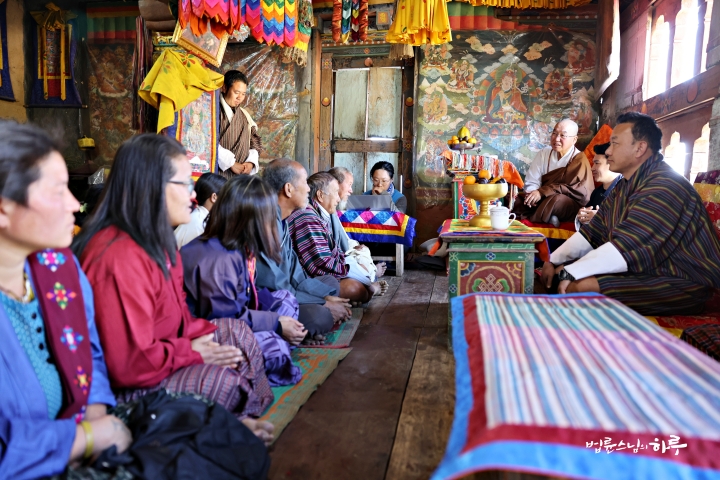
In Kamjong village, there were as many as 17 households without homes. From our previous surveys, we found that in one chiok, there were about 7-8 households without homes. However, Kamjong, despite being a smaller unit than a chiok, had more than double the number of homeless households. Additionally, various issues were revealed, such as 20 households lacking access to sufficient drinking water.
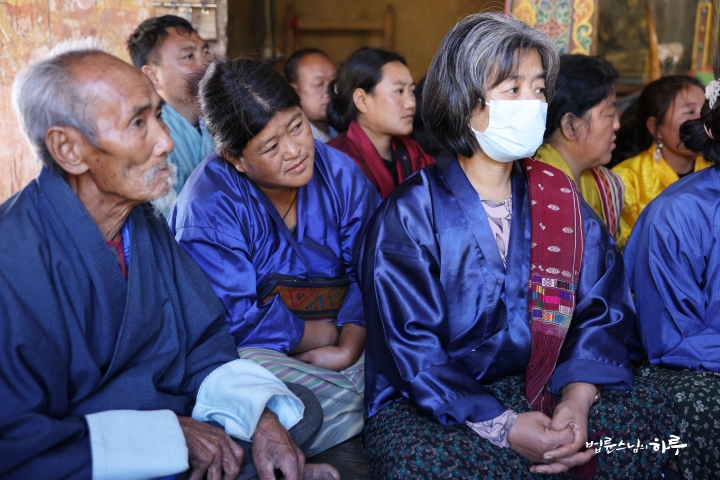
Nevertheless, the residents had a strong will to actively solve the problems. They said that if materials were provided, they would build houses themselves and carry out improvement works such as supplying drinking water to the village. Sunim encouraged the residents and said:
“The purpose of this project is to improve happiness levels by making even small homes clean and convenient. We can certainly do this ourselves without waiting for the government to act.”
“Yes, we can!”
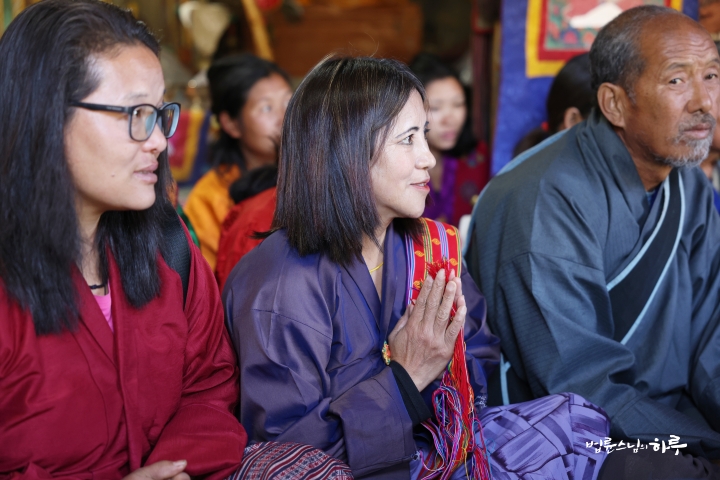
“So, let’s repair our houses and make our village a better place to live by ourselves.”
“Yes, we will do that!”
After finishing the conversation with the residents, Sunim had lunch prepared by the villagers and then moved to Duengmang village.
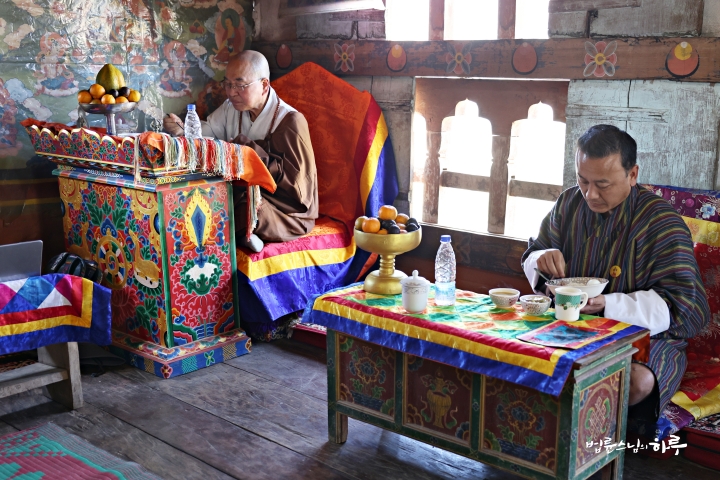
The road to Duengmang village was bumpy and winding. After about 30 minutes, the temple and villagers began to appear in the distance.
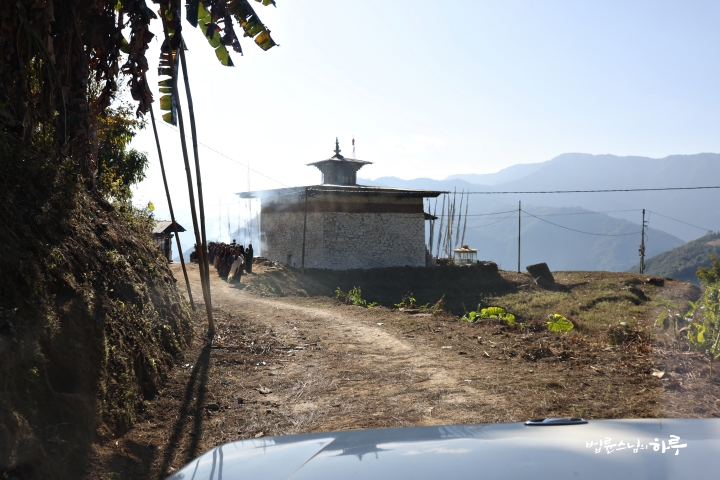
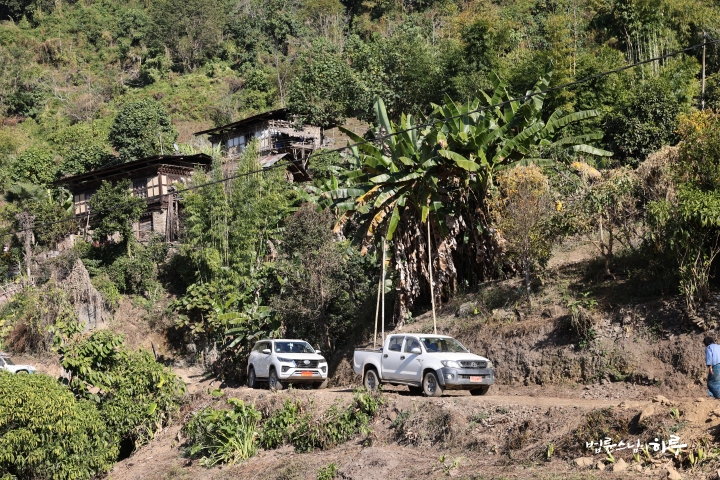
After greeting the residents, Sunim visited the temple and then went to the community hall.
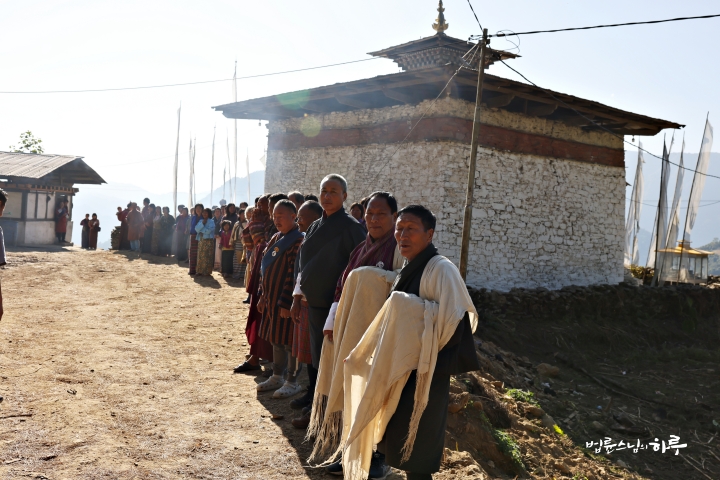
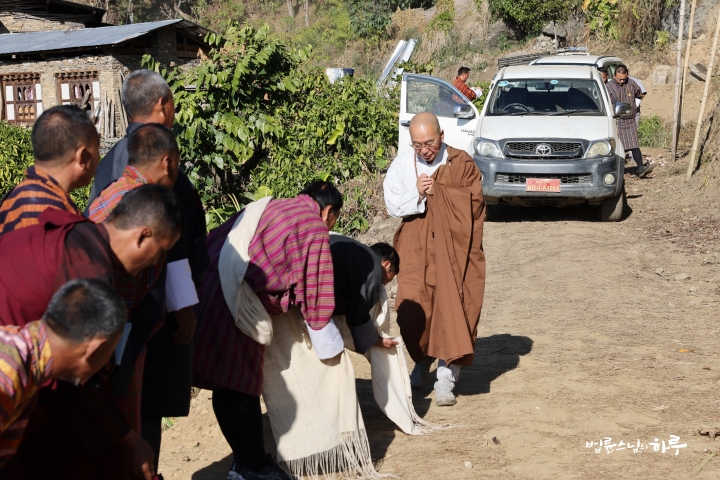
There were about 20 residents gathered in front of the hall.
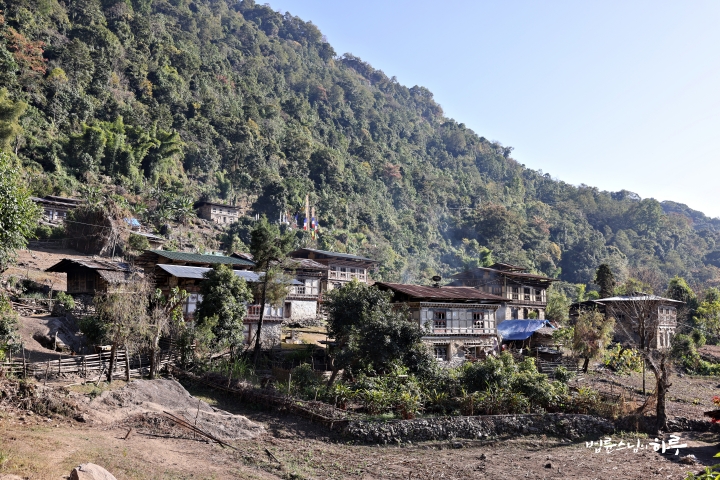
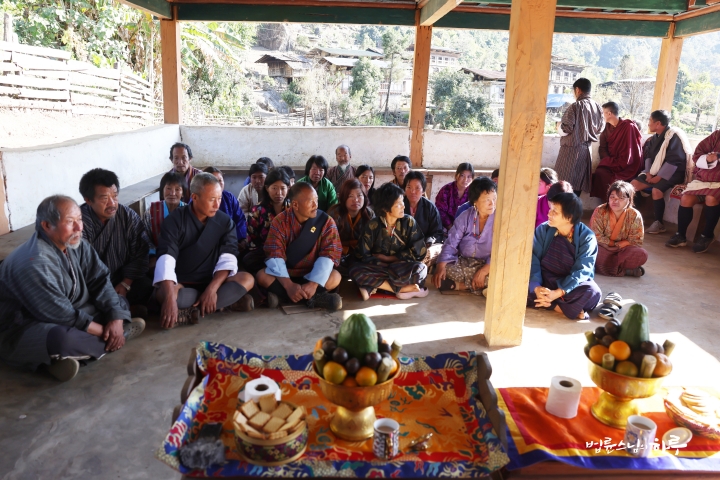
After the Tshogpa of Duengmang introduced the village situation, Sunim greeted the residents. Duengmang village also had many households without homes. Although the houses appeared well-built and fenced from the outside, the survey revealed that there were as many as 8 households without homes.
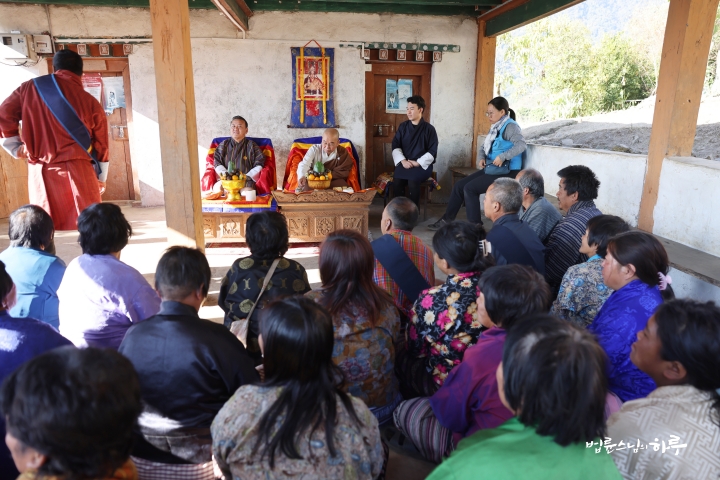
An interesting point was that most were making efforts to build houses. While two households had made no preparations, the remaining six were in various stages: some had prepared wood, some only needed cement, and others just needed to put on the roof. The residents made specific requests for necessary materials and showed a strong willingness to build houses themselves if materials were provided.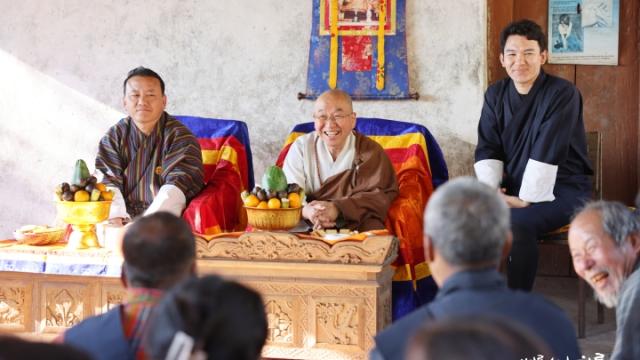
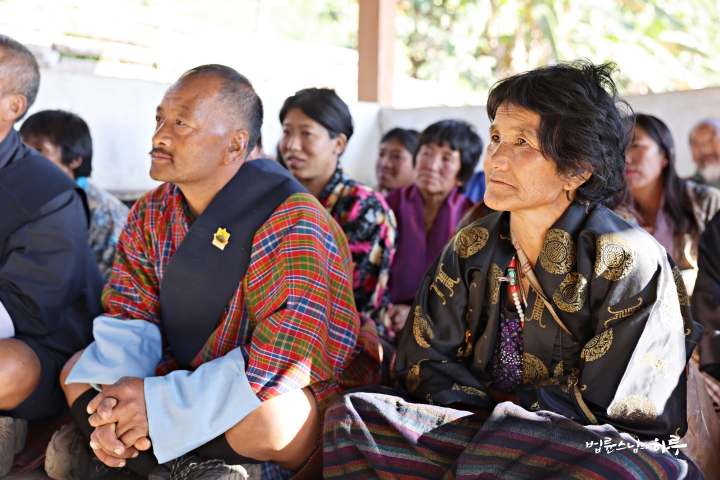
After about an hour of conversation with the residents, it was decided to support necessary materials for households without houses, pave roads with cement in the village, fence the fields, repair the water supply, and improve the living environment by repairing each household as needed.
“Can you do all of this? Don’t rush too much. Let’s try to do what we discussed today slowly over three years.”
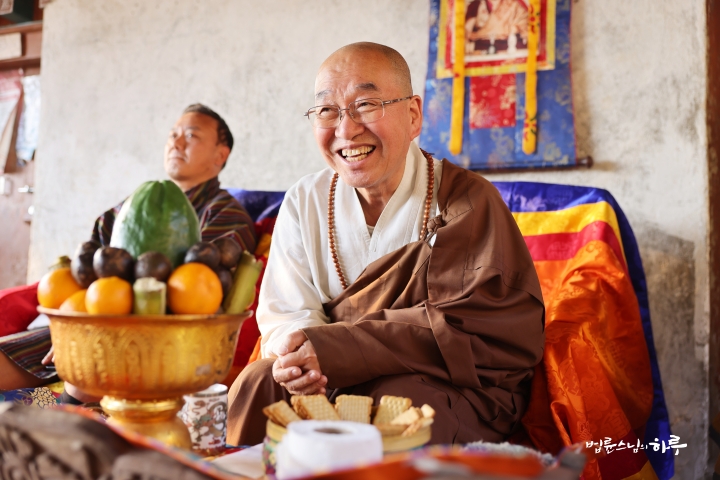
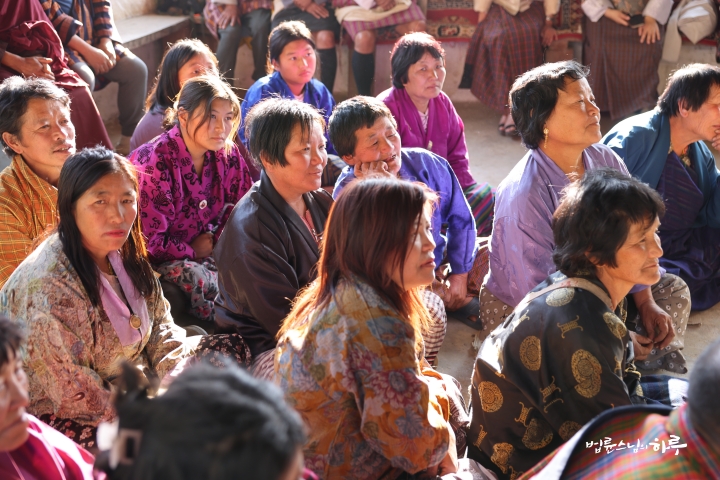
Encouraged by Sunim’s words, the residents strengthened their resolve. After the conversation, the residents of Dengmang presented Sunim with carefully prepared offerings. Sunim instructed that the offerings be shared among the residents and gave a donation to the Tshogpa, asking him to use it for the benefit of the residents.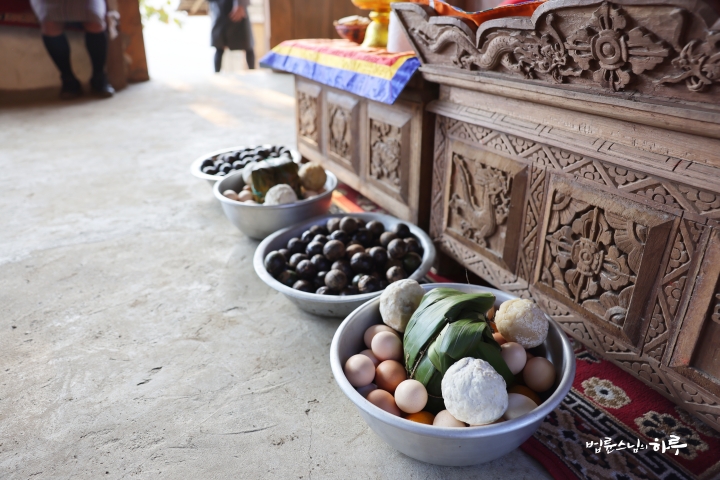
At 4 o’clock, the day’s survey was completed. After bidding farewell to the Governor of Zhemgang, Sunim set out on the return journey to the lodging.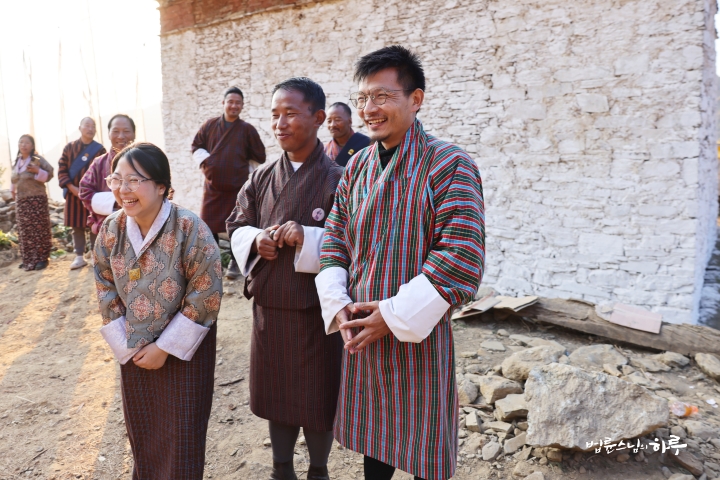
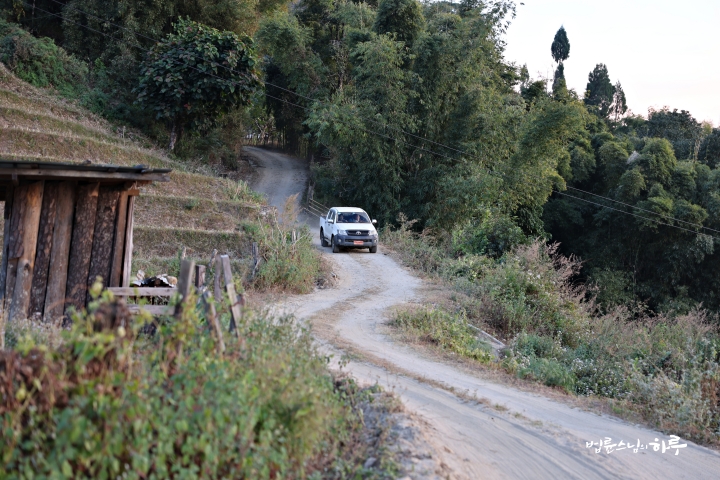
On the way back, Sunim stopped at a collapsed stupa in Kamjong. A monk had expressed a desire to move and restore this stupa elsewhere.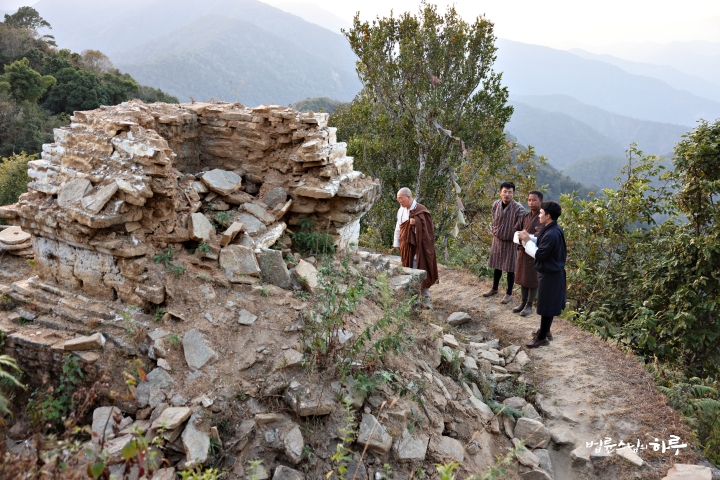
The stupa was in a severely damaged state. After examining the site for a while, Sunim advised:
“Moving the stupa would be too much work. It might be better to repair it in its current location. If you decide to restore it here to its original state, I will arrange for support.”
At 6:30 PM, Sunim arrived at the lodging and had dinner with the group, discussing the day’s survey.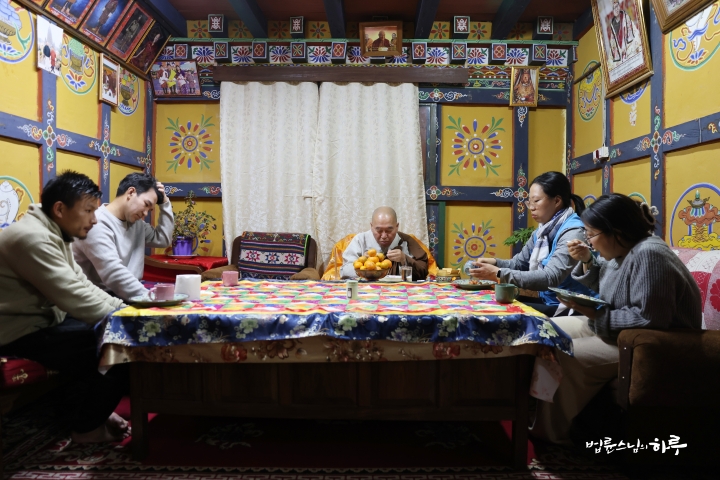
Sunim mentioned the projects that would be simultaneously carried out in Zhemgang Province and explained the anticipated challenges.
“When the projects in Zhemgang Province are in full swing, we’ll need at least five planners like Nolbu. (Laughter) Nolbu will have to train administrators while managing the projects.”
Sunim anticipated Nolbu’s efforts in advance and added that cooperation with the central government should also be considered.
“The first year will be difficult. However, if we establish a good order of work during that year, things will naturally follow that flow afterwards. But the first year won’t be easy because we lack experience and don’t have a clear picture yet.”
Yeshi from the central government said:
“Good luck.”
Sunim smiled and corrected the statement:
“Let’s create our luck together! That’s how we should say it. (Laughter)”
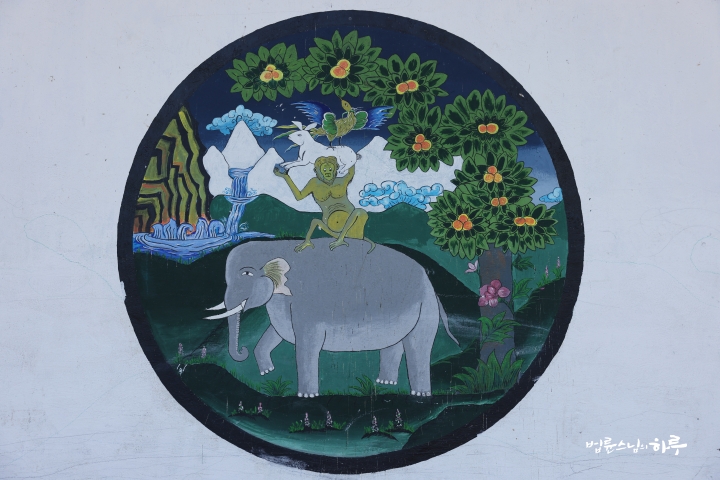
Although it was a tiring day, everyone ended it with laughter. Tomorrow, Sunim plans to survey the lake in the Buli area, meet and talk with the residents of Kikhar Chiwog, and then have a meeting with the Governor of Zhemgang.
As there was no Dharma talk today, we will introduce the content of the Dharma Q&A session held in Seongnam City on the 16th.
I’ve Changed Jobs Ten Times, and I’m Worried About How to Find a New Job
“You should apply only for contract positions, not permanent ones. You’re likely to quit anyway, so there’s no need for a permanent position. Try working on a contract basis, and if it’s good, extend it; if not, leave. Ending a job when a contract expires is not the same as quitting a company. However, resigning from a permanent position midway is considered quitting the company. If you look for contract work, it will be easier to find jobs and beneficial for your career. There’s no problem with that.”
“Yes, thank you for the wise advice.”
“I understand the preference for permanent positions if it’s because of higher salaries, but otherwise, I don’t see many advantages to permanent positions. Why should a person born as a human being tie themselves to one company for life? It’s good to try different things, go to different places, and experience various jobs.
Try to think more freely than you do now. A woman once asked me what sin she had committed in her past life to have been married three times. So I asked her in return,
‘What good deeds did you do in your past life to be married three times?’
I haven’t been married even once, but she’s been married three times, so it’s a great blessing, isn’t it? It’s all about how you view things. I’m not saying whether being married three times is fortunate or unfortunate. I’m saying that depending on how you set your standards, you can see things differently.
In rural areas, there are many elderly women living alone. Usually, rural men pass away between 80 and 85 years old. However, women often live beyond 90. So when I hold events for the elderly, the majority are grandmothers. When we see grandmothers whose husbands are still alive, we think it’s good that both have lived long lives. However, for grandmothers with living husbands, the husbands are usually a bit older and in poor health. For example, if a grandmother is 85, her husband might be around 88. At that age, most men are not in good health. So the grandmother has to take care of her husband and finds it difficult to participate in elderly events or trips. That’s why grandmothers say it’s a great blessing when their husbands pass away early. (Laughter)
So, men need to be careful. If you want your wife to feel that your long life is a blessing, you should not become a burden and always treat her well. If a husband keeps asking his wife to do this and that, the wife might think, ‘Why should I continue to serve even in old age?’ This can lead to conflicts. That’s why in Japan, terms like ‘twilight divorce’ and ‘graduation from marriage’ are becoming common, causing more problems.
How you perceive things depends on your perspective. You tend to set high standards for yourselves and think, ‘I don’t know how to do anything.’ There are many advantages to being a non-regular employee, but because you’re so fixated on becoming a regular employee, you end up thinking, ‘I’m not succeeding in my career.’ Don’t view yourself negatively. If your habits or karma are a certain way, try to accept them positively. Change what you can, and for what you can’t change, accept yourself as you are and live accordingly.
“Thank you.”




